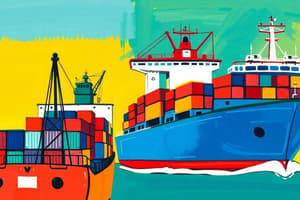Podcast
Questions and Answers
What is the primary purpose of a pre-loading checklist?
What is the primary purpose of a pre-loading checklist?
- To verify that all cargo holds are clean and dry
- To ensure the vessel is stable and the cargo plan is sound (correct)
- To check if the crew members are properly trained
- To determine the optimal route for the voyage
Which of the following is NOT typically included in a pre-loading checklist?
Which of the following is NOT typically included in a pre-loading checklist?
- Calculating the fuel consumption for the planned voyage (correct)
- Inspecting the cargo holds for any damage or debris
- Verifying that all required documentation is in order
- Reviewing the cargo plan for potential overloading issues
What is the primary goal of verifying vessel stability calculations during the pre-loading process?
What is the primary goal of verifying vessel stability calculations during the pre-loading process?
- To calculate the fuel consumption for the planned route
- To prevent overloading and maintain stability during the voyage (correct)
- To ensure the vessel can withstand harsh weather conditions
- To determine the optimal speed for the vessel during the voyage
Which of the following is NOT a responsibility listed in the loading checklist?
Which of the following is NOT a responsibility listed in the loading checklist?
What is the purpose of inspecting cargo holds and equipment during the pre-loading process?
What is the purpose of inspecting cargo holds and equipment during the pre-loading process?
Which of the following is NOT a responsibility listed in the loading checklist?
Which of the following is NOT a responsibility listed in the loading checklist?
What is the purpose of using appropriate lashing methods and equipment during cargo loading?
What is the purpose of using appropriate lashing methods and equipment during cargo loading?
Which of the following is NOT a typical responsibility listed in the loading checklist?
Which of the following is NOT a typical responsibility listed in the loading checklist?
What is the purpose of continuously monitoring cargo loading and stability during the loading process?
What is the purpose of continuously monitoring cargo loading and stability during the loading process?
Which of the following is a responsibility listed in the loading checklist?
Which of the following is a responsibility listed in the loading checklist?
Study Notes
Safe Cargo Handling
- Ensuring safe and efficient cargo operations onboard ships is crucial, and checklists play a vital role in minimizing accidents, cargo damage, and delays, while protecting the environment and crew well-being.
Pre-Loading Checklist
- Vessel stability calculations must be verified and approved
- Cargo plan reviewed and approved for compliance with vessel capabilities and IMO regulations
- Cargo information available, including weight, dimensions, hazardous materials, and special handling requirements
- Cargo holds inspected for cleanliness, structural integrity, and proper ventilation
- Hatch covers and securing equipment in good working order
- Lifting gear and lashing materials certified and appropriate for cargo type and weight
- Personal protective equipment (PPE) available and in good condition for all personnel involved
- Communication with Shore: agree on loading procedures, timelines, and safety precautions
Loading Checklist
- Cargo loaded according to the approved cargo plan
- Proper weight distribution maintained throughout the vessel
- Cargo secured using appropriate lashing methods and equipment
- Cargo protected from weather and other environmental factors
- Continuous monitoring of cargo loading and stability
- Documentation of all loading activities, including cargo details, weights, and securing methods
Transit/Underway Checklist
- Regular monitoring of cargo securement and lashings
- Check cargo for signs of damage, shifting, or leaks, and take corrective actions promptly
- Ensure proper ventilation in holds to prevent cargo deterioration and buildup of harmful gases
- Regularly inspect and tighten securing measures to prevent cargo movement during rough seas
- Vessel stability continuously monitored and adjusted as needed
- Ballast water management plan adhered to
- Weather forecasts monitored and appropriate actions taken for adverse conditions
- Emergency procedures reviewed and crew familiarized with their roles
- Communication maintained with shore authorities and other relevant parties
Studying That Suits You
Use AI to generate personalized quizzes and flashcards to suit your learning preferences.
Description
Explore the significance of utilizing checklists for safe and efficient cargo operations on ships, complying with IMO regulations. Learn about the structured approach checklists offer in identifying and addressing potential risks.




